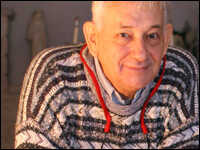Music During the Great Depression Awesome Only Was I m Going to Make It More Than I Did It Again

Dusko Condic grew up in Bridgeport, on Chicago'due south due south side, in a family of 8 children. His mother was a widow. He says growing up in poverty during the Great Depression made him a stronger person. Neenah Ellis for NPR hide explanation
toggle explanation
Neenah Ellis for NPR

Dusko Condic grew up in Bridgeport, on Chicago'due south south side, in a family unit of 8 children. His female parent was a widow. He says growing up in poverty during the Not bad Depression made him a stronger person.
Neenah Ellis for NPR

Les Orear, president emeritus of the Illinois Labor History Club, gives a tour of the order'due south downtown museum. He is 97. Neenah Ellis for NPR hide caption
toggle explanation
Neenah Ellis for NPR

Les Orear, president emeritus of the Illinois Labor History Society, gives a tour of the society'south downtown museum. He is 97.
Neenah Ellis for NPR

Giggi Cortese, 81, has lived in Bridgeport all her life. Growing up during the Great Low was hard, she says, but she drew strength from her family, friends and St. Jerome Catholic Church. Neenah Ellis for NPR hide caption
toggle caption
Neenah Ellis for NPR

Giggi Cortese, 81, has lived in Bridgeport all her life. Growing up during the Dandy Depression was hard, she says, but she drew strength from her family, friends and St. Jerome Catholic Church building.
Neenah Ellis for NPR
The Great Depression of the 1930s is on peoples' minds these days. If you have family members who lived through it, yous may hear their stories at the dinner table this Thanksgiving.
Information technology was a period of protests and hunger marches — and unionism spread like wildfire — but many people suffered quietly, aback of their poverty. No matter what their situation, the Great Depression inverse those in the generation that survived it.
During those years, Chicago was especially hard-hit. Unemployment was every bit high every bit twoscore percent in some neighborhoods. The city was more than segregated than it is at present.
Wanda Bridgeforth, who is from the Bronzeville area known every bit the "Black Metropolis," says she has rich memories of those years. Information technology was a fairly flush neighborhood — jazz peachy Louis Armstrong lived at that place, and so did Ida B. Wells — until hard times came.
"In the Depression, the men could non become jobs, and especially the black men," Bridgeforth says. "Here was my male parent with a caste in chemistry, and he could not go a task."
Bridgeforth's father was humiliated, she says. He fell apart, and so her mother took what piece of work she could find as a alive-in domestic worker. Bridgeforth, who was in course school, was boarded out.
"She told me that this is the way it has to be," Bridgeforth says. "And so we either do it and survive, or don't do it and don't survive."
Bridgeforth was sent to live with relatives and sometimes with strangers.
"I house we lived in — at that place were xix of u.s.a. in a half dozen-room house," she says.
Bridgeforth did learn to share and cooperate, she says, but and then many years going without left a mark on her.
"The kids do say that I'm a pack rat," she says. "And they say, 'Well, what are you going to use this for?' and I say, 'I don't know, but I'm going to use it.' "
Surviving Winters Near Lake Michigan
In Chicago's oldest Mexican neighborhood, near Lake Michigan in South Chicago, Henry Martinez says the winters were so cold, they huddled around the potbelly stove.
Martinez's parents had thirteen children, and they lived hand-to-rima oris in a flat with shared bathrooms.
"You wanted to take a bathroom, you heat up the water in these big cans," Martinez says. "It was always a challenge to keep warm — nosotros hugged each other on the flooring. Nosotros had lilliputian beds that open up and shut. When I retrieve well-nigh it, it was horrible. It was horrible. Then the sanitation of the community — garbage was but put in the alley — and did that create a condition? Yeah it did: TB [tuberculosis]. I know my sis came down with TB. Sometimes I like to block that out and only say, 'Cheers God you're here.' "
He thanks God merely says the Cosmic Church didn't do much to help his family dorsum then. At 76, Martinez works every bit a customs organizer trying to help his one-time neighborhood, which is still poor.
Downtown Chicago Before The Unions
In a downtown Chicago office, right next to the El tracks, Les Orear remembers an easier childhood. Orear, 97, is now president emeritus of the Illinois Labor History Club.
Merely in the 1920s, Orear's begetter was a newspaperman, and Orear was in higher when the stock market crashed.
"Pretty soon I got a call that I'd have to come back to Chicago and help back up my family," Orear says. "Hm!"
He got a task at the stockyards making 37.5 cents a day. Chicago was a hotbed of matrimony organizing in the 1930s, and Orear defended himself to bringing in the union. He says it made him feel useful.
"It was a wonderful time for me because here I was this young fella, and radical ideas are coming nowadays, I feel like I'm in the cusp," Orear says. "I'grand ane of those that is giving leadership to the working force that'due south going into the matrimony. ... And it'due south going on all over the country. I'm non a lone warrior. I'm part of a vast machine."
Just Orear has no memories of Thanksgiving or Christmas "whatever," he says.
"All of those holidays were so incidental," Orear says. "Nosotros in the yards did non accept Christmas. We had Christmas off, but it was a 24-hour interval with no pay."
It was the same for Thanksgiving, and Orear says there were no vacations or benefits.
"It's difficult now for young people — for anybody — to call up, that'due south the fashion the globe worked in those days, before unions. That is the deviation, kiddos."
Born To Immigrants In Bridgeport
Bridgeport, s of the Loop, is home to the White Sox. Church steeples sprout from this working class neighborhood of the Irish, Italians, Shine, Lithuanians, Chinese and Croatians of St. Jerome'due south Parish.
Many of them were born during the '20s to immigrant parents.
Giggi Besic Cortese, 81, has lived in the neighborhood all her life. She lives on a cake full of two-story brick and frame houses with narrow sidewalks between them. She said boarders stayed upstairs, including a man named John Vuk who took her to the show every Sunday.
"Do you known how I survived those days?" Cortese asks. "[Information technology] was going to the evidence every Dominicus to run across Shirley Temple, just [I] tell you, she was my inspiration to continue living. Honest to goodness, I couldn't expect till Sunday, and we would sit and wait for John Vuk to say, 'Come up, ve get to the bear witness, ve go to the bear witness today.' You can certainly say that people had heart for one some other — and if they were able to help, by and large they did."
Dusko Condic, 77, who is also from the Bridgeport neighborhood, says his father died "a relatively young man," in his early on 40s.
"He left eight of u.s.," Condic says. "Unfortunately, we lost the house. I tin can retrieve to this day — and I get emotional when I think of information technology — literally being placed on the sidewalk [with] every final possession that my poor mother had considering she wasn't able to supposedly pay the mortgage. And an incredible number of people came to my mothers' assist, literally wheeling wheelbarrows of coal to help warm the house."
Condic and his friends have a lot of good memories, likewise. They were children glued to the radio every Sun.
"There's nix they like better than gathering around the table and telling stories from the sometime days," Condic says. "Today, on Thanksgiving, their children and grandchildren might ask about the Slap-up Depression they say, just they're pretty sure the kids don't really understand."
"My blood brother Marking has ten kids, and somewhere along the line they tend to condone the value of coin," Condic says. " 'Oh, Dad, it's only money. So what, I tin can brand more.' And on more than one occasion, he tells them, 'Hey kids, God heaven forbid if the Depression comes around once more. I won't be opening upward the window and jumping out, but I can come across you guys doing it.' I retrieve that's probably true."
There'south grit in this generation of Chicagoans — and something of a swagger, too. The human being who cries about his female parent'due south struggles can boast in the face of today's catastrophe.
Says Condic: "Tomorrow I could lose everything, but somehow I'm not agape. I really am not."
Source: https://www.npr.org/templates/story/story.php?storyId=97468008
0 Response to "Music During the Great Depression Awesome Only Was I m Going to Make It More Than I Did It Again"
Post a Comment